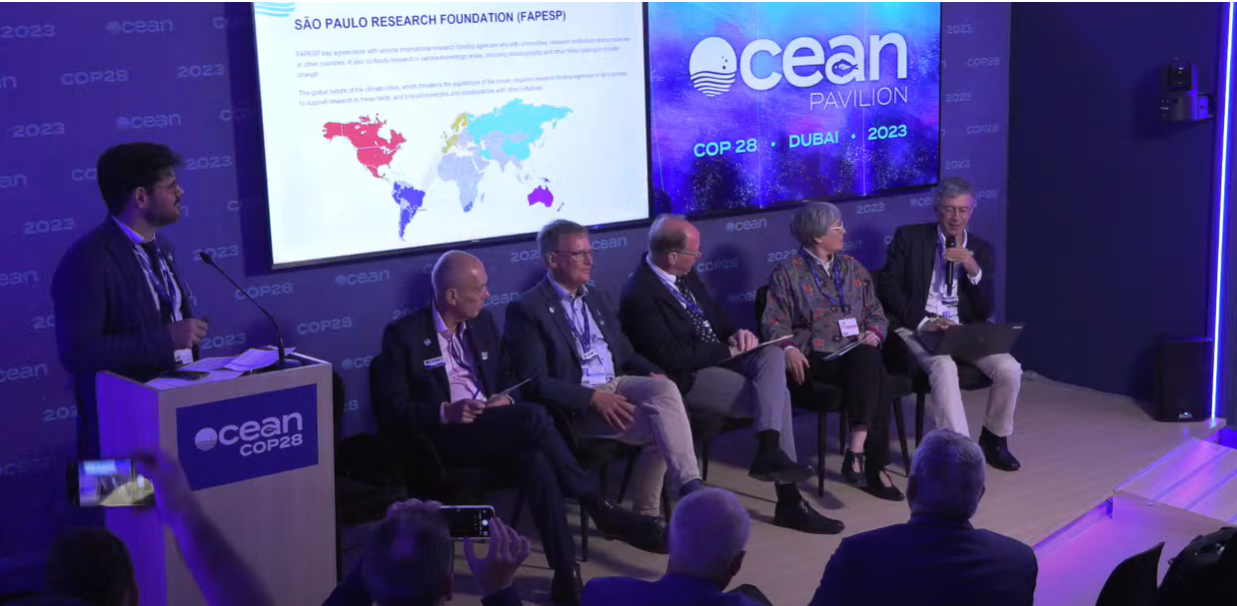


Chief Administrative Officer Fernando Menezes presented on FAPESP’s initiatives in research on the oceans, biodiversity and bioenergy in a panel discussion organized by the scientific coalition at COP28 in Dubai (photo: reproduced courtesy of Ocean Pavilion)
Published on 01/08/2024
By Elton Alisson | Agência FAPESP – Representatives of FAPESP, other research funders and oceanographic research institutions from several countries met during COP28, the United Nations Climate Change Conference held in Dubai, United Arab Emirates (UAE), on November 30-December 12, 2023, to strengthen a scientific coalition that will establish the International Panel for Ocean Sustainability (IPOS).
The coalition, formed in April 2023 at a meeting in Brussels, Belgium, expects the official launch of IPOS to take place at the next UN Ocean Conference, scheduled for 2025 in Nice, France (read more at: agencia.fapesp.br/41736).
The Panel’s mission will be to bridge the science-policy divide and help protect the world’s ocean environment. “We want IPOS to be a sort of intelligence center. Its essence will be scientific but it will translate scientific information into decisions by policymakers,” said Fernando Menezes, FAPESP’s Chief Administrative Officer and its representative in the scientific coalition. “Its primary goal, therefore, will be to provide a space for scientists to talk not to their peers but to policymakers worldwide.”
The coalition’s launch was announced in a declaration signed by France’s National Center for Scientific Research (CNRS) and FAPESP, with 14 other institutions: Alfred Wegener Institute for Polar and Marine Research (Germany), Autonomous University of Barcelona (UAB, Spain), European Academy of Sciences (EurASc, Brussels), French National Institute for Ocean Science (IFREMER), GEOMAR Helmholtz Center for Ocean Research Kiel (Germany), MARE (Portugal), Mercator Ocean International (France), Monaco Scientific Center (CSM), National Museum of Natural History (MNHN, Paris), Ocean Institute of the Alliance Sorbonne University (France), University of Western Brittany (UBO, France), University of the Azores (UAc, Portugal), UNESCO Chair on Ocean Sustainability (USP/IEA/IO-USP, Brazil), and Woods Hole Oceanographic Institution (WHOI, USA).
Besides Menezes, the participants in the panel session on the scientific coalition held during COP28 were Antoine Petit, CEO of CNRS; Peter de Menocal, President of WHOI; Toste Tanhua, a senior researcher at GEOMAR; and Françoise Gaill, President of the Ocean Sustainability Foundation.
Other matters discussed by the panel included how to increase the impact of decisions relating to the oceans using evidence-based scientific information in global negotiations, and the need for cross-border synergies to boost funding for oceanographic research.
“The representatives of the institutions that took part in the panel had an opportunity to present on their initiatives and experience in converting science into policy, as exemplified by BIOTA [FAPESP’s Research Program on Biodiversity Characterization, Conservation, Restoration and Sustainable Use],” Menezes said.
FAPESP and the University of São Paulo (USP), represented by Alexander Turra, a professor at USP’s Oceanographic Institute (IO), organized a second panel session on ways of pursuing a transdisciplinary agenda of science and action to foster ocean sustainability in the Global South.
Among the issues raised by the participants was the existence of gaps in scientific knowledge that hinder action to conduct a transition toward ocean sustainability, especially in the countries of the Global South. “The discussion focused on ways of strengthening ocean sustainability as part of the effort to tackle the climate crisis, as well as the importance of ocean science and its development in the Global South. We invited several experts with experience in producing or funding science in the Global South to discuss how to create more mechanisms and strengthen them so we can produce the ocean science we need for the future of the planet we desire,” Turra told Agência FAPESP.
Ocean Pavilion
Both panels with participation by FAPESP were held in the Ocean Pavilion, an initiative designed to raise the visibility of the oceans and highlight their importance to climate negotiations and all life on the planet.
Organized by WHOI and the Scripps Institute of Oceanography, part of the University of California San Diego (UCSD), the Ocean Pavilion was the venue for more than 80 events and meetings during the two weeks of COP28, including a series of in-depth discussions on such topics as rising sea levels, climate and the living ocean, and the blue economy and finance (read more at: agencia.fapesp.br/50266).
A five-minute video on oceanographic research in São Paulo was exhibited during the event. Produced by FAPESP’s communication unit, it features interviews with Marco Antonio Zago, President of FAPESP, and Carlos Gilberto Carlotti Junior, Rector of USP. They talk about their institutions’ support for oceanographic research in the state.
The video also features footage from Diário de Bordo, a series of short films produced by Agência FAPESP aboard the Marion Dufresne, one of the world’s largest ocean research vessels, as it takes Brazilian and French researchers on the Amaryllis oceanographic expedition. The seven episodes of Diário de Bordo are available from Agência FAPESP on its YouTube channel.
Source: https://agencia.fapesp.br/50594